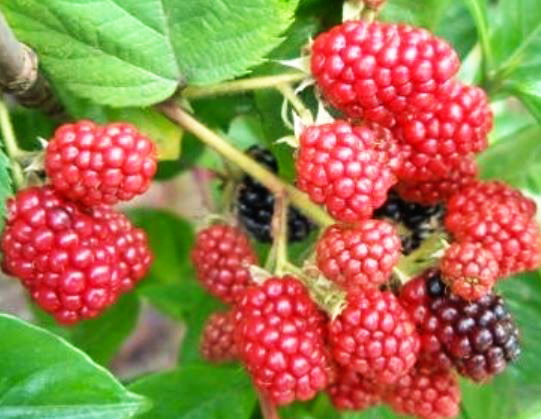- Delicious raspberries are low in calories and fats. Nonetheless, they are rich source of dietary fiber, and antioxidants. 100 g berries hold just 52 calories but provide 6.5 g of fiber (16% of daily recommended intake).
- Raspberries have significantly high levels of phenolic flavonoid phytochemicals such as anthocyanins, ellagic acid (tannin), quercetin, gallic acid, cyanidins, pelargonidins, catechins, kaempferol and salicylic acid. Scientific studies show that the antioxidant compounds in these berries play potential role against cancer, aging, inflammation, and neuro-degenerative diseases.
- Xylitol is a low-calorie sugar substitute extracted from raspberries. A teaspoonful of xylitol carries just 9.6 calories as compared to 15 calories of sugar. Xylitol absorbed into the blood more slowly in the intestines than simple sugar and does not contribute to high glycemic index. It thus, can be helpful in diabetics to regulate wide fluctuations of blood sugar levels.
- Fresh raspberries are an excellent sources of vitamin-C, which is also a powerful natural antioxidant. 100 g berries provide 26.2 mg or about 47% of DRI of vitamin C. Consumption of fruits rich in vitamin C helps the human body develop resistance against infectious agents, counter inflammation, and scavenge harmful free radicals.
- Raspberry contains anti-oxidant vitamins like vitamin A, and vitamin E. In addition to the above-mentioned antioxidants, it is also rich in several other health promoting flavonoid poly phenolic antioxidants such as lutein, zea-xanthin, and ß-carotene, albeit in small amounts. Altogether, these compounds help act as protective scavengers against oxygen-derived free radicals and reactive oxygen species (ROS) that play a role in aging and various disease processes.
- Raspberry has an ORAC value (oxygen radical absorbance capacity) of about 4900 µmol TE per 100 grams, crediting it among the top-ranked ORAC fruits.
- They contain a good amount of minerals like potassium, manganese, copper, iron and magnesium. Potassium is an important component of cell and body fluids that helps controlling heart rate and blood pressure. Manganese is utilized by the body as a co-factor for the antioxidant enzyme, superoxide dismutase. Copper is required in the production of red blood cells.
- They are rich in B-complex group of vitamins and vitamin K. The berries contain very good amounts of vitamin B-6, niacin, riboflavin, and folic acid. These vitamins are function as co-factors and help body in the metabolism of carbohydrates, protein, and fats.

Raspberry (Fu Pen Zi)
TCM professionele activiteiten:
1. Senior docent van European Academy of Traditional Medical Science en Dutch Acupuncture Academy:



2. Senior docent en stagebegeleider van Shenzhou Open Universiteit in Amsterdam



3. bestuurslid van Association TCMned

3. lid van Nederlandse Vereniging voor Acupunctuur sinds 1990

Praktijk is aangesloten bij de Koepel Alternatieve Behandelwijzen voor klachtenregeling




